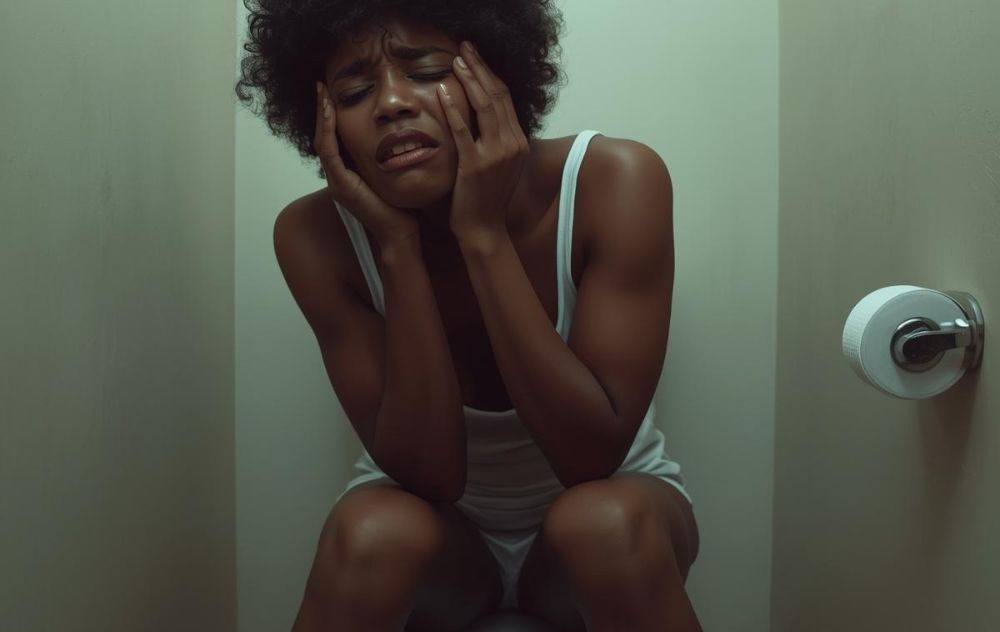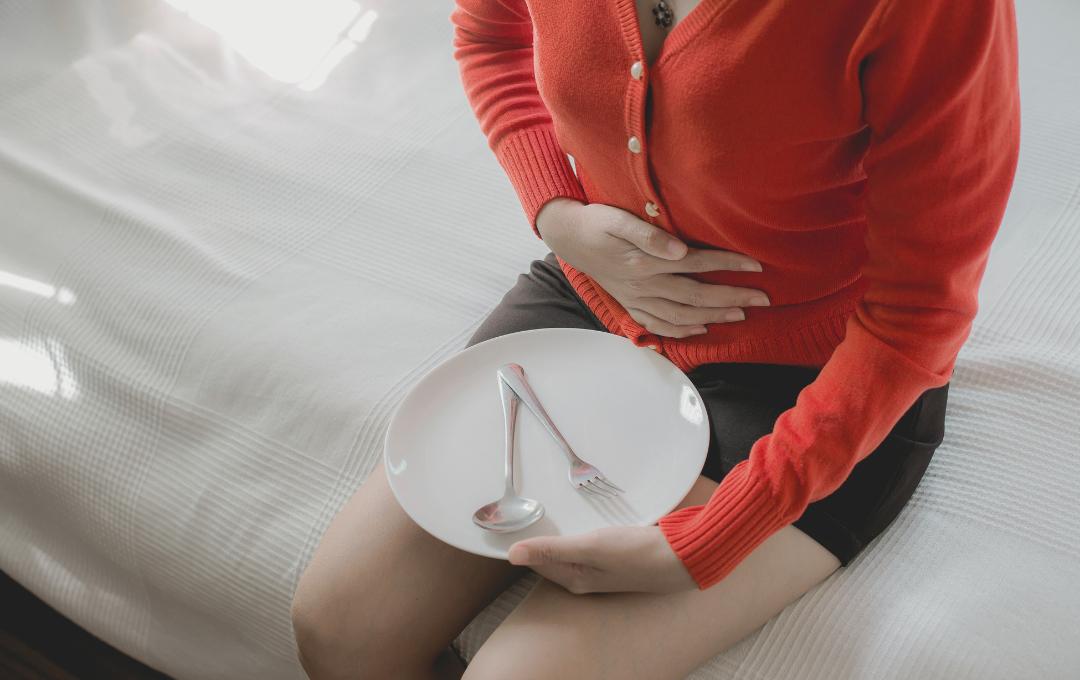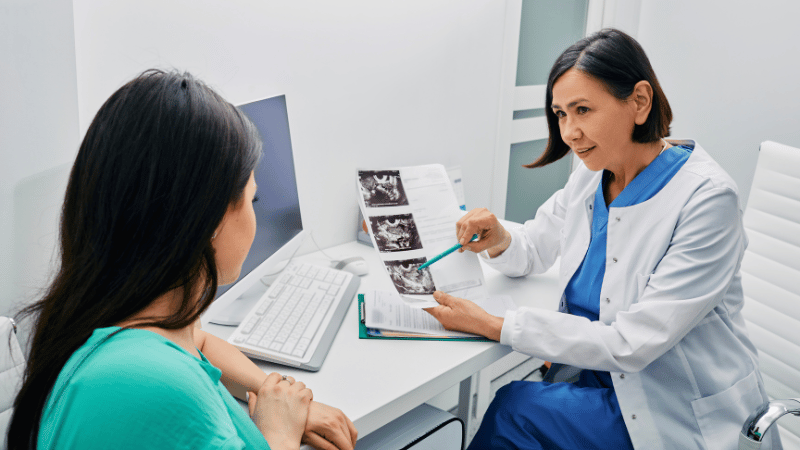
The modern world has opened up conversations about bodily functions that were once strictly taboo. Since Charmin bears introduced toilet paper on television, more conditions related to the pelvis and digestion have become mainstream, making people more aware of their treatment options. This new openness has helped with discussing health issues like uterine fibroids.
Many women suffer in silence, assuming that constant bloating, frequent urination, or painful constipation is “normal.” But what if these frustrating, everyday symptoms are actually caused by pressing on the bladder or bowel?
This phenomenon is directly tied to the fibroid’s size and exact location. Below, we answer your questions about how a fibroid pressing on the bladder and bowel can cause symptoms.
How Uterine Fibroid Pressure Disrupts Urinary and Digestive Function
Women wonder how fibroids cause bladder or bowel symptoms. The answer is primarily through compression. As they grow, they may press directly against the bladder, reducing its capacity to hold urine. This compression can also impact nearby organs, resulting in different symptoms depending on where the fibroid is pressing:
- Fibroid tumor pressing on the bladder: An enlarged uterus reduces bladder capacity. Even small amounts of urine can trigger the urge to urinate.
- Fibroids pressing on the bowel: Posterior fibroids may narrow the upper rectum, slowing bowel movements and making them more difficult.
- Fibroids causing an enlarged uterus: An enlarged uterus can affect bowel movement, because it typically expands upward or backward due to fibroid growth, applying pressure on the colon.
The pressure fibroids can place on the bladder may also irritate the pelvic nerves responsible for bladder sensation and bowel function. Pressure along these nerve pathways can increase urinary urgency, heighten the sensation of fullness, or create discomfort.
How Fibroid Location Affects the Bowels and Bladder
In addition to pressure, the fibroid’s location within the uterus can affect symptom type and severity.
- Posterior fibroids that develop toward the back of the uterus can press on the colon (large intestine) from the outside, which can lead to chronic, significant constipation.
- Anterior fibroids, or growths that develop toward the front of the body, can cause bladder-dominant symptoms. Meanwhile, large or multiple fibroids can cause a mixture of both types of symptoms.
Can Fibroids Come out in the Toilet?
Another fear women have is whether fibroids can come out in the toilet. This is a very understandable and important question, but the simple answer is no. Fibroids are solid tumors that grow within the uterus and are attached to its outer surface.
Recognizing Fibroid Pressure Patterns: Bladder (Urinary) vs. Bowel (Digestive) Symptoms
When fibroids create pressure on the bowel or bladder, the resulting discomfort can be categorized into clear patterns:
- Bowel Dominance: Symptoms include straining during bowel movements, which can sometimes contribute to the development of hemorrhoids.
- Bladder Dominance: Patients may struggle to fully empty their bladder, leaving them with the constant urge to urinate or causing frequent bathroom trips.
Understanding whether your discomfort is primarily urinary, digestive, or mixed is essential for your physician to accurately pinpoint the underlying cause.
Bladder Issues Caused by Fibroids
Fibroids can cause various bladder problems by creating a smaller reservoir for urine, leading to:
- Frequent, small-volume urination
- Nighttime urination (nocturia)
- A sensation of incomplete emptying of the bladder
- Weak urinary stream despite adequate hydration
- Pelvic pressure that worsens throughout the day
Some patients may experience severe symptoms from a fibroid tumor pressing on the bladder. Signs like burning during urination, blood in the urine, or the sudden inability to urinate are all urgent signs that require a medical evaluation.
Bowel Symptoms Caused by Fibroids
Aside from bladder issues, fibroids can also affect bowel movements in a few ways. One example is how fibroids can cause significant pain during a bowel movement.
Other effects include:
- Upper rectum narrowing: This can lead to constipation, straining, painful bowel movements, or pencil-thin stools.
- Pelvic and rectal pressure: Creates a sensation of fullness even after having a bowel movement.
- Gas and bloating: Fibroids can cause gas and bloating when stool remains in the colon longer than usual or when they trap gas within the intestines.
- Fibroids bowel obstruction: Rare but may present with severe pain, vomiting, or inability to pass gas or stool.
Since the bladder and bowel share the pelvic space, symptoms of bowel pressing on the bladder or vice versa may coincide. Keeping a brief daily diary that includes hydration, fiber intake, menstrual cycle timing, and bathroom habits can help a fibroid specialist identify patterns.
Bladder and Bowel Issues: Ruling Out Conditions That Mimic Fibroid Pressure
While fibroids often explain urinary urgency or constipation, they aren’t the only possible cause. Many gastrointestinal conditions, including IBS and pelvic outlet dysfunction, can cause symptoms that overlap with fibroids.
Other conditions that present similarly include:
- Pelvic Floor Disorders: Pelvic floor dysfunction can cause symptoms such as urgency and incomplete emptying.
- Gynecologic Conditions: Endometriosis, adenomyosis, and ovarian cysts or masses can cause pelvic pressure, bowel changes, and painful bowel movements.
- Urinary Tract Conditions: An overactive bladder and recurring UTIs can also cause similar symptoms to those caused by uterine fibroids.
Menstrual cycle-related changes may also influence digestion and lead to potential issues. Since various conditions can cause bladder and bowel issues, consulting medical professionals, such as fibroid specialists, can help narrow down the likely cause.
Hormonal Impact on Fibroids and Bowel Problems
Uterine fibroids exist within an estrogen- and progesterone-responsive environment. Fluctuations in these reproductive hormones can impact the entire digestive system. This hormonal influence can alter overall gut motility (the speed at which food moves through the GI tract), increase gassiness, and heighten pelvic sensitivity. As a result, the presence of fibroids may exacerbate existing digestive issues, leading to symptoms like constipation and bloating, particularly during the menstrual cycle.
Confirming Diagnosis and Treatment Options for Fibroid Pressure
While fibroid size and location often reflect the symptoms you experience, consulting a specialist is necessary to confirm the diagnosis and rule out other conditions. Once a diagnosis is confirmed through imaging (such as ultrasound or MRI), the specialist will discuss different treatment options for fibroids pressing on the bladder.
Uterine fibroid embolization (UFE) is a key option as it shrinks fibroids by blocking their blood supply, reducing pressure on the bladder and bowel. Following UFE, many patients experience reduced urinary frequency, less pelvic pressure, and relief from constipation.
Find Relief with USA Fibroid Centers
Early evaluation at USA Fibroid Centers can help prevent worsening fibroid symptoms and provide faster relief. With advanced imaging technology and careful review of symptom patterns, our specialists can help determine whether fibroids or another condition is causing bladder and bowel issues.
When fibroids are the cause, uterine fibroid embolization (UFE) offers an effective, minimally invasive option to ease organ pressure while preserving the uterus. Don’t suffer in silence.
FAQs about Uterine Fibroids, Bowel and Bladder Symptoms
Will reducing fibroid size help with urgency and constipation?
Reducing fibroid size can help relieve urgency and constipation. When fibroids shrink, they reduce pressure on the bowel and bladder, which can ease these symptoms.
How long after UFE do bladder or bowel issues improve?
Most patients report symptom improvement from fibroids pressing on the bladder and bowel, occurring around three to six months after UFE. Larger fibroids may continue shrinking up to nine to twelve months after treatment.
Can fibroids cause bleeding during bowel movement?
Fibroids themselves don’t cause bleeding during bowel movements, but they can cause straining due to constipation, which irritates veins in the rectum, ultimately causing internal or external hemorrhoids.




